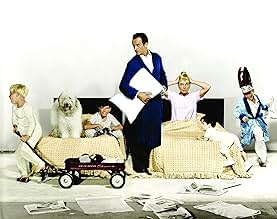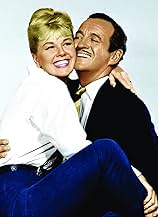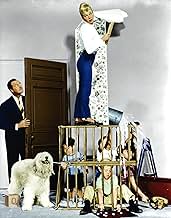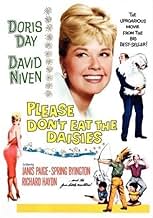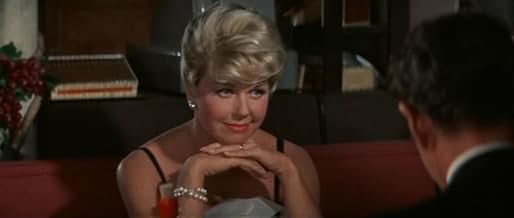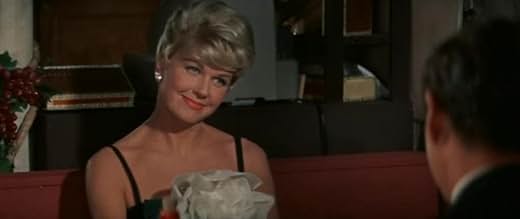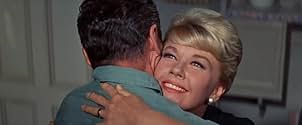CALIFICACIÓN DE IMDb
6.4/10
5.2 k
TU CALIFICACIÓN
Un catedrático deja su trabajo para convertirse en crítico de teatro, creando problemas para amigos y familia.Un catedrático deja su trabajo para convertirse en crítico de teatro, creando problemas para amigos y familia.Un catedrático deja su trabajo para convertirse en crítico de teatro, creando problemas para amigos y familia.
- Dirección
- Guionistas
- Elenco
- Premios
- 5 nominaciones en total
Madge Blake
- Mrs. Kilkinny
- (escenas eliminadas)
Barbara Aberle
- Guest
- (sin créditos)
Eddie Baker
- Sardi's Patron
- (sin créditos)
- Dirección
- Guionistas
- Todo el elenco y el equipo
- Producción, taquilla y más en IMDbPro
Opiniones destacadas
'Please Don't Eat the Daisies' is another Doris Day film that was seen recently as a quest to see all of her films not yet seen. After seeing it, 'Please Don't Eat the Daisies' is worth seeing, it is not quite as fresh as a daisy but sticking with it and seeing it grow is worth it.
Day has certainly done much better films, as has David Niven and Charles Walters, but Day has also done worse. 'Please Don't Eat the Daisies' at its best is delightful and doesn't try to do any more than necessary and be more than it is. Its reputation seems to be mixed to lukewarm, count me in as those who thinks it deserves better. It is certainly not without its faults.
Like in 'It Happened to Jane', and almost as badly, the children are badly cast, try far too hard to be cute and end up being so sugary cutesy it'll give one toothache and are at their worst rather obnoxious. The film does drag a little towards the end, as a result of trying to do a little too much, and a couple of scenes at this point are not placed as comfortably as they could have been.
Likewise with the otherwise pleasant songs, the title song coming off best. Once again Day sounds beautiful, musically and in an interpretative sense she's spot on and there is a lot of sincerity in her singing.
Day is a sheer delight in 'Please Don't Eat the Daisies' too. She is perky and charming with a naturally sparkling presence and deft comic timing. David Niven is debonair and urbane and the two gel so well and dazzle together. Niven is particularly good with Janis Paige however, which boast some hilarious moments. Great support from lively Janis Paige, ever scene-stealing Spring Byington and suitably stuffy Richard Haydn.
Charles Walters seems comfortable with the material, and handles it and the cast well and mostly handles the various subplots adeptly. There is a lot going on here with five subplots, the story could easily have been bloated but manages not to be and it's all done in a way that's fun and relatable.
Much of 'Please Don't Eat the Daisies' has a fast, snappy pace, only being bogged down towards the end. The script is easy to relate to, very funny in a light way and has a surprisingly sophisticated edge.
Visually it's all very colourful and stylish with exemplary use of CinemaScope, while the music has energy and nuance.
In conclusion, not perfect but a nice film that passes the time inoffensively, and is more than a just for completests film. 7/10 Bethany Cox
Day has certainly done much better films, as has David Niven and Charles Walters, but Day has also done worse. 'Please Don't Eat the Daisies' at its best is delightful and doesn't try to do any more than necessary and be more than it is. Its reputation seems to be mixed to lukewarm, count me in as those who thinks it deserves better. It is certainly not without its faults.
Like in 'It Happened to Jane', and almost as badly, the children are badly cast, try far too hard to be cute and end up being so sugary cutesy it'll give one toothache and are at their worst rather obnoxious. The film does drag a little towards the end, as a result of trying to do a little too much, and a couple of scenes at this point are not placed as comfortably as they could have been.
Likewise with the otherwise pleasant songs, the title song coming off best. Once again Day sounds beautiful, musically and in an interpretative sense she's spot on and there is a lot of sincerity in her singing.
Day is a sheer delight in 'Please Don't Eat the Daisies' too. She is perky and charming with a naturally sparkling presence and deft comic timing. David Niven is debonair and urbane and the two gel so well and dazzle together. Niven is particularly good with Janis Paige however, which boast some hilarious moments. Great support from lively Janis Paige, ever scene-stealing Spring Byington and suitably stuffy Richard Haydn.
Charles Walters seems comfortable with the material, and handles it and the cast well and mostly handles the various subplots adeptly. There is a lot going on here with five subplots, the story could easily have been bloated but manages not to be and it's all done in a way that's fun and relatable.
Much of 'Please Don't Eat the Daisies' has a fast, snappy pace, only being bogged down towards the end. The script is easy to relate to, very funny in a light way and has a surprisingly sophisticated edge.
Visually it's all very colourful and stylish with exemplary use of CinemaScope, while the music has energy and nuance.
In conclusion, not perfect but a nice film that passes the time inoffensively, and is more than a just for completests film. 7/10 Bethany Cox
i really like this film. unlike some other reviewers i think the chemistry between niven and day is strong - they presented like a genuine married couple. the script is versatile, witty on the one hand, but also able to shift to the more dramatic. the argument between day and niven as he reveals his desire for professional success is very well done. niven himself was laugh out loud funny on many occasions, and the portrayal of parenthoood was quite charming. the song at the school doesn't do anything for me, so i tend to fast forward past that scene. however that is a matter of personal preference: i enjoy doris day as an actress much more than as a singer. it's an amusing, easy going, light hearted film, perfect for afternoon viewing.
You're glad they made movies like "Please Don't Eat The Daisies" alright, simply to prove there was a time people were more innocent. Sitting through it is another matter.
The central problem with "Please Don't Eat The Daisies" as it stands today is that it suffers from a major case of indecision: Does it want to be about a theater critic who gets a big head, or does it want to be about a Manhattan mom with four sons who finds a new home in Westchester County? Doris Day stars doing what she does best, throwing off clever one-liners with a maternal glow, doing a little bit of singing, and standing by her man, in this case David Niven as theater critic Lawrence Mackay, who probably doesn't deserve her but as played by the winning Niven keeps our sympathies enough to make us happy he convinces her otherwise.
Mackay is quite taken by his new role as the Frank Rich of Mayor Wagner-era Broadway, but she's worried his becoming an influential quipmeister has made him mean, a candidate for a ride on the "down-a-lator" as expressed by a producer who used to be Mackay's friend until one of Mackay's catty reviews sundered their relationship. The producer, played by Richard Hadyn in much the same jaded manner he brought to his impresario role in "The Sound Of Music" five years later, accelerates Mackay's notoriety by having the starlet of his latest play, "Mme. Fantan," slap Mackay across the face for the benefit of a newspaper photographer after he disses her performance.
There's a great idea for a story here, about a critic coming up against the egos of himself and others, but unfortunately the result doesn't give Day much to do. Niven is neither unfaithful to her nor really all that nasty a critic. Instead of trying to make the story work better, which admittedly would risk running against the grain of a Doris Day comedy, the film throws in a subplot, about the couple and their four sons moving up the Hudson River to the bucolic suburb of Hooton and the resulting mild turmoil that causes. Thus, the entire second half of the film feels as awkwardly tacked on as the musical numbers Day performs in the final third of the programme.
It's all rather stupid, yes, but winsome, too, in that nice way that makes one nostalgic for the early 1960s. The scenery is attractively shot. The supporting actors are fun. Of the Day numbers, one, "Any Way The Wind Blows," is a terrific number with a busy bassline and some nice dipping harmonies that recalls Elvis Presley's "King Creole," fetchingly performed by Day and members of the cast as the "Hooton Holler Players." Never mind that groaner of a name, it's a good routine. The other number, the title song sung by Day and a merry band of children, should have been cut but for the fact it's a Doris Day movie and a drippy song with a kiddie chorus was what her audience wanted.
The same can be said for the whole movie. "Please Don't Eat The Daisies" is charming in a way films wouldn't dare be today. The dialogue is unnaturally whipsmart Neil-Simonesque, even when it's Day talking to one of her sons ("All he does is eat and sleep." "He's a dog. What d'ya want from him, blank verse?"). The youngest boy is clearly overdubbed by a woman with a cutesy voice, saying "Cokee Cola" as he drops water bags on people in a way that's supposed to suggest Tom Sawyer, not lawsuits. The dog jumps into Niven's arms at the sight of a squirrel, and he raises his magnificent eyebrows as only David Niven can at the idea of finding himself in a lightweight suburban farce.
Day makes you glad you stopped by, a suburbanite dream in her snug Capri slacks who finds the humor in every scene. Limited, yes, but very good in her genre, enough to make a film like this at least intermittently entertaining. She and Niven do play very well off each other. Like Michael E. Barrett wrote here in another review, the scene of them in the restaurant together after Niven has had his face slapped is a terrifically acted sequence, underplayed well by both stars.
Unfortunately, the rest of film doesn't rise to that same level of subtlety. Instead, she does her suburban mom thing while he plays the non-vicious critic with a vicious reputation, until at the end we are asked to pretend the twain come to meet and all is resolved. It doesn't, but the nicest thing to be said for "Please Don't Eat The Daisies" is that it's so genial it makes you willing to pretend otherwise.
The central problem with "Please Don't Eat The Daisies" as it stands today is that it suffers from a major case of indecision: Does it want to be about a theater critic who gets a big head, or does it want to be about a Manhattan mom with four sons who finds a new home in Westchester County? Doris Day stars doing what she does best, throwing off clever one-liners with a maternal glow, doing a little bit of singing, and standing by her man, in this case David Niven as theater critic Lawrence Mackay, who probably doesn't deserve her but as played by the winning Niven keeps our sympathies enough to make us happy he convinces her otherwise.
Mackay is quite taken by his new role as the Frank Rich of Mayor Wagner-era Broadway, but she's worried his becoming an influential quipmeister has made him mean, a candidate for a ride on the "down-a-lator" as expressed by a producer who used to be Mackay's friend until one of Mackay's catty reviews sundered their relationship. The producer, played by Richard Hadyn in much the same jaded manner he brought to his impresario role in "The Sound Of Music" five years later, accelerates Mackay's notoriety by having the starlet of his latest play, "Mme. Fantan," slap Mackay across the face for the benefit of a newspaper photographer after he disses her performance.
There's a great idea for a story here, about a critic coming up against the egos of himself and others, but unfortunately the result doesn't give Day much to do. Niven is neither unfaithful to her nor really all that nasty a critic. Instead of trying to make the story work better, which admittedly would risk running against the grain of a Doris Day comedy, the film throws in a subplot, about the couple and their four sons moving up the Hudson River to the bucolic suburb of Hooton and the resulting mild turmoil that causes. Thus, the entire second half of the film feels as awkwardly tacked on as the musical numbers Day performs in the final third of the programme.
It's all rather stupid, yes, but winsome, too, in that nice way that makes one nostalgic for the early 1960s. The scenery is attractively shot. The supporting actors are fun. Of the Day numbers, one, "Any Way The Wind Blows," is a terrific number with a busy bassline and some nice dipping harmonies that recalls Elvis Presley's "King Creole," fetchingly performed by Day and members of the cast as the "Hooton Holler Players." Never mind that groaner of a name, it's a good routine. The other number, the title song sung by Day and a merry band of children, should have been cut but for the fact it's a Doris Day movie and a drippy song with a kiddie chorus was what her audience wanted.
The same can be said for the whole movie. "Please Don't Eat The Daisies" is charming in a way films wouldn't dare be today. The dialogue is unnaturally whipsmart Neil-Simonesque, even when it's Day talking to one of her sons ("All he does is eat and sleep." "He's a dog. What d'ya want from him, blank verse?"). The youngest boy is clearly overdubbed by a woman with a cutesy voice, saying "Cokee Cola" as he drops water bags on people in a way that's supposed to suggest Tom Sawyer, not lawsuits. The dog jumps into Niven's arms at the sight of a squirrel, and he raises his magnificent eyebrows as only David Niven can at the idea of finding himself in a lightweight suburban farce.
Day makes you glad you stopped by, a suburbanite dream in her snug Capri slacks who finds the humor in every scene. Limited, yes, but very good in her genre, enough to make a film like this at least intermittently entertaining. She and Niven do play very well off each other. Like Michael E. Barrett wrote here in another review, the scene of them in the restaurant together after Niven has had his face slapped is a terrifically acted sequence, underplayed well by both stars.
Unfortunately, the rest of film doesn't rise to that same level of subtlety. Instead, she does her suburban mom thing while he plays the non-vicious critic with a vicious reputation, until at the end we are asked to pretend the twain come to meet and all is resolved. It doesn't, but the nicest thing to be said for "Please Don't Eat The Daisies" is that it's so genial it makes you willing to pretend otherwise.
Based on the popular book by Jean Kerr, PLEASE DON'T EAT THE DAISY is probably the best of Doris Day's 1960s comedies--and it finds her surprisingly paired with David Niven. While the two may seem an unlikely couple, they have extremely good on-screen chemistry, and the film neatly balances its story between the two stars so that neither overshadows the other.
Day plays Kate MacKay, mother of four hellions and the long suffering wife of esoteric drama critic Larry MacKay (Niven.) With her husband under siege by every actor, director, and producer in town, Kate decides to move the family to a home in the country--and in the process leaves her husband open to the temptations of Broadway star Deborah Vaughn (Janis Paige.) Before too long, Larry's swelling ego threatens their happy home.
The cast is expert, with both Day and Niven extremely enjoyable and Janis Paige memorable as the Broadway siren who attempts to lead Niven astray; the supporting roles are also expertly handled by a cast that includes Spring Byington. The script is witty with a dash of sophisticated sparkle, and unlike most of Day's later comedies manages to avoid the feel of frantic farce. A truly enjoyable outing; pure fun all the way.
Gary F. Taylor, aka GFT, Amazon Reviewer
Day plays Kate MacKay, mother of four hellions and the long suffering wife of esoteric drama critic Larry MacKay (Niven.) With her husband under siege by every actor, director, and producer in town, Kate decides to move the family to a home in the country--and in the process leaves her husband open to the temptations of Broadway star Deborah Vaughn (Janis Paige.) Before too long, Larry's swelling ego threatens their happy home.
The cast is expert, with both Day and Niven extremely enjoyable and Janis Paige memorable as the Broadway siren who attempts to lead Niven astray; the supporting roles are also expertly handled by a cast that includes Spring Byington. The script is witty with a dash of sophisticated sparkle, and unlike most of Day's later comedies manages to avoid the feel of frantic farce. A truly enjoyable outing; pure fun all the way.
Gary F. Taylor, aka GFT, Amazon Reviewer
A drama critic, his wife, and four sons move from sophisticated New York digs to community-centered suburbia. Naturally adjustment problems ensue.
All in all, this A-film is a disappointment. Drama critics are just not the stuff of comedies, nor does Niven get help in lightening the mood. Then too, since both stars were at career peaks, the screenplay expands their screen time with a lot of draggy exposition that doesn't help the amusement factor. And since the plight of Broadway critics is not exactly grist for popular audiences, I expect Day was added to provide the needed appeal. Trouble is she doesn't get to do her usual sparkle. It's a subdued role a dozen lesser names could have handled, and even her meager musical numbers are not exactly show stoppers. Moreover, director Walters seems unsure what to do with the bratty boys, who could have been milked for some laughs instead of too many groans. Still, the near two-hours does have its moments, especially with a cowardly canine, and Janis Paige (Deborah) whose ambitious vixen hits just the right notes. Anyhow, the chemistry never really gels and Day fans should stick with Rock who at least gets an honorable mention from the screenplay.
All in all, this A-film is a disappointment. Drama critics are just not the stuff of comedies, nor does Niven get help in lightening the mood. Then too, since both stars were at career peaks, the screenplay expands their screen time with a lot of draggy exposition that doesn't help the amusement factor. And since the plight of Broadway critics is not exactly grist for popular audiences, I expect Day was added to provide the needed appeal. Trouble is she doesn't get to do her usual sparkle. It's a subdued role a dozen lesser names could have handled, and even her meager musical numbers are not exactly show stoppers. Moreover, director Walters seems unsure what to do with the bratty boys, who could have been milked for some laughs instead of too many groans. Still, the near two-hours does have its moments, especially with a cowardly canine, and Janis Paige (Deborah) whose ambitious vixen hits just the right notes. Anyhow, the chemistry never really gels and Day fans should stick with Rock who at least gets an honorable mention from the screenplay.
¿Sabías que…?
- TriviaThe musical number Kate rehearses for the amateur show, "Any Way The Wind Blows," had been written for Doris Day's previous film Problemas de alcoba (1959). The song title was, for a while, even the working title of that film.
- ErroresWhen Kate Mackay (Doris Day) is putting on her makeup at the beginning of the film, she tells the boys "Oh fellas, now you know I have to meet David-" and stops mid-sentence. She should have used Larry, Laurence, Dad, or some other character reference rather than the actor's (David Niven) name.
- Citas
Alfred North: For a critic that first step is the first printed joke. It gets a laugh and a whole new world opens up. He makes another joke, and another. And then one day along comes a joke that shouldn't be made because the show he's reviewing is a good show. But, as it so happens, it's a good joke. And you know what? The joke wins.
- ConexionesFeatured in The Adventures of Ozzie and Harriet: The Magic Dishes (1960)
Selecciones populares
Inicia sesión para calificar y agrega a la lista de videos para obtener recomendaciones personalizadas
- How long is Please Don't Eat the Daisies?Con tecnología de Alexa
Detalles
- Fecha de lanzamiento
- País de origen
- Idioma
- También se conoce como
- Please Don't Eat the Daisies
- Locaciones de filmación
- Productora
- Ver más créditos de la compañía en IMDbPro
Taquilla
- Presupuesto
- USD 1,775,000 (estimado)
- Tiempo de ejecución1 hora 52 minutos
- Relación de aspecto
- 2.35 : 1
Contribuir a esta página
Sugiere una edición o agrega el contenido que falta

Principales brechas de datos
By what name was Eramos tan felices (1960) officially released in India in English?
Responda

